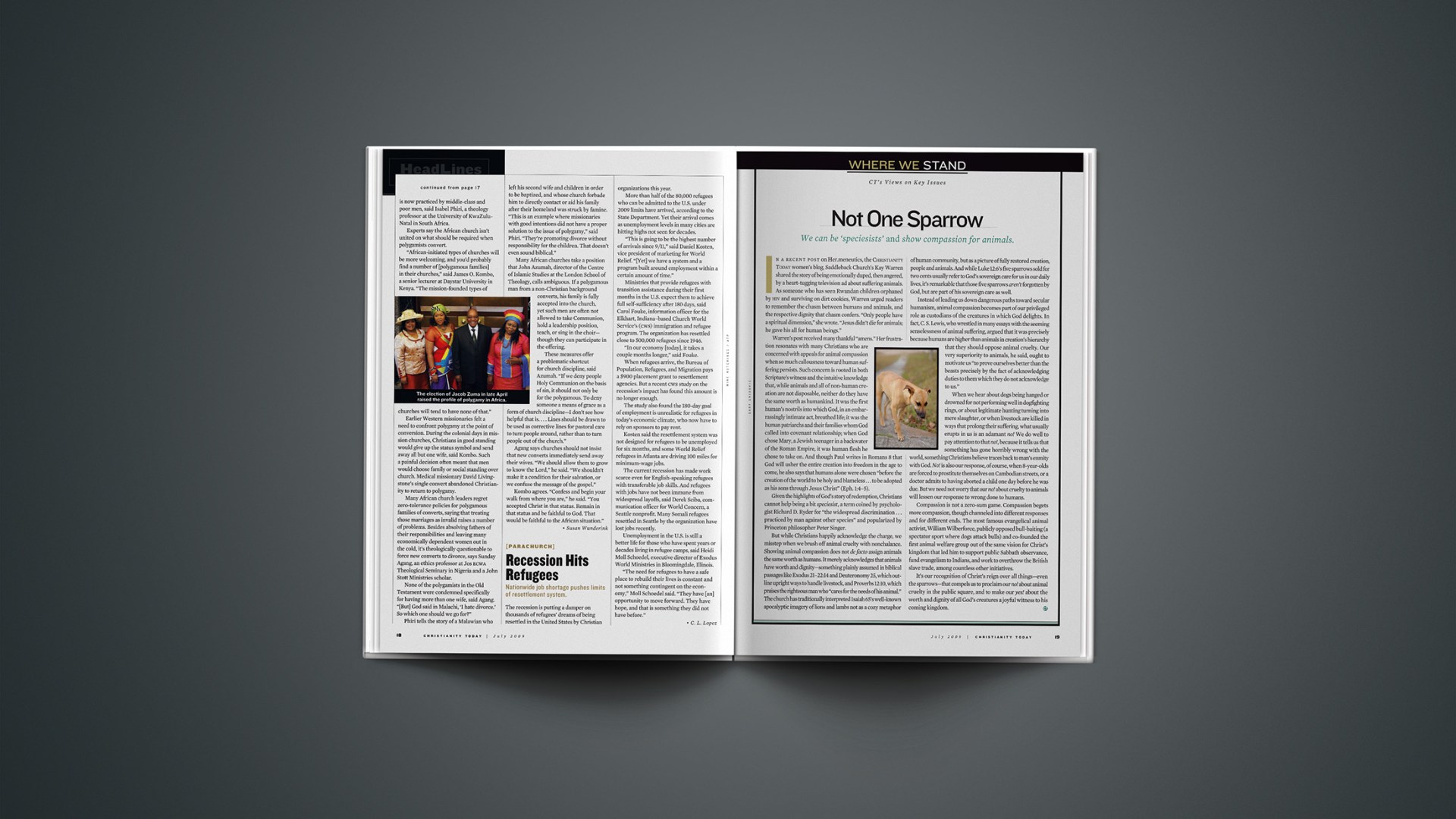In a recent post on Her.meneutics, the Christianity Today women’s blog, Saddleback Church’s Kay Warren shared the story of being emotionally duped, then angered, by a heart-tugging television ad about suffering animals. As someone who has seen Rwandan children orphaned by hiv and surviving on dirt cookies, Warren urged readers to remember the chasm between humans and animals, and the respective dignity that chasm confers. “Only people have a spiritual dimension,” she wrote. “Jesus didn’t die for animals; he gave his all for human beings.”
Warren’s post received many thankful “amens.” Her frustration resonates with many Christians who are concerned with appeals for animal compassion when so much callousness toward human suffering persists. Such concern is rooted in both Scripture’s witness and the intuitive knowledge that, while animals and all of non-human creation are not disposable, neither do they have the same worth as humankind. It was the first human’s nostrils into which God, in an embarrassingly intimate act, breathed life; it was the human patriarchs and their families whom God called into covenant relationship; when God chose Mary, a Jewish teenager in a backwater of the Roman Empire, it was human flesh he chose to take on. And though Paul writes in Romans 8 that God will usher the entire creation into freedom in the age to come, he also says that humans alone were chosen “before the creation of the world to be holy and blameless … to be adopted as his sons through Jesus Christ” (Eph. 1:4-5).
Given the highlights of God’s story of redemption, Christians cannot help being a bit speciesist, a term coined by psychologist Richard D. Ryder for “the widespread discrimination … practiced by man against other species” and popularized by Princeton philosopher Peter Singer.
But while Christians happily acknowledge the charge, we misstep when we brush off animal cruelty with nonchalance. Showing animal compassion does not de facto assign animals the same worth as humans. It merely acknowledges that animals have worth and dignity—something plainly assumed in biblical passages like Exodus 21-22:14 and Deuteronomy 25, which outline upright ways to handle livestock, and Proverbs 12:10, which praises the righteous man who “cares for the needs of his animal.” The church has traditionally interpreted Isaiah 65’s well-known apocalyptic imagery of lions and lambs not as a cozy metaphor of human community, but as a picture of fully restored creation, people and animals. And while Luke 12:6’s five sparrows sold for two cents usually refer to God’s sovereign care for us in our daily lives, it’s remarkable that those five sparrows aren’t forgotten by God, but are part of his sovereign care as well.
Instead of leading us down dangerous paths toward secular humanism, animal compassion becomes part of our privileged role as custodians of the creatures in which God delights. In fact, C. S. Lewis, who wrestled in many essays with the seeming senselessness of animal suffering, argued that it was precisely because humans are higher than animals in creation’s hierarchy that they should oppose animal cruelty. Our very superiority to animals, he said, ought to motivate us “to prove ourselves better than the beasts precisely by the fact of acknowledging duties to them which they do not acknowledge to us.”
When we hear about dogs being hanged or drowned for not performing well in dogfighting rings, or about legitimate hunting turning into mere slaughter, or when livestock are killed in ways that prolong their suffering, what usually erupts in us is an adamant no! We do well to pay attention to that no!, because it tells us that something has gone horribly wrong with the world, something Christians believe traces back to man’s enmity with God.No! is also our response, of course, when 8-year-olds are forced to prostitute themselves on Cambodian streets, or a doctor admits to having aborted a child one day before he was due. But we need not worry that our no! about cruelty to animals will lessen our response to wrong done to humans.
Compassion is not a zero-sum game. Compassion begets more compassion, though channeled into different responses and for different ends. The most famous evangelical animal activist, William Wilberforce, publicly opposed bull-baiting (a spectator sport where dogs attack bulls) and co-founded the first animal welfare group out of the same vision for Christ’s kingdom that led him to support public Sabbath observance, fund evangelism to Indians, and work to overthrow the British slave trade, among countless other initiatives.
It’s our recognition of Christ’s reign over all things—even the sparrows—that compels us to proclaim our no! about animal cruelty in the public square, and to make our yes! about the worth and dignity of all God’s creatures a joyful witness to his coming kingdom.
Copyright © 2009 Christianity Today. Click for reprint information.
Related Elsewhere:
More editorials are available on our site.
Previous Christianity Today articles about animals or animal rights include:
Keeping Pets in Their Place | Why we can’t afford to treat animals like they’re humans. (April 29, 2008)
The Back Page: Taming Beasts | “Raising the moral status of dogs has created a breed of snarling, dangerous humans” (April 1, 2003)










